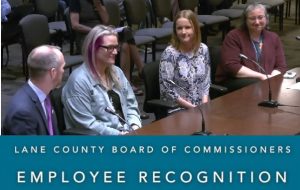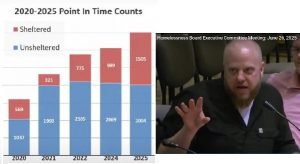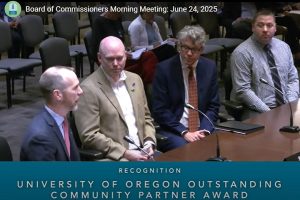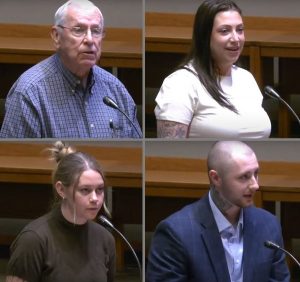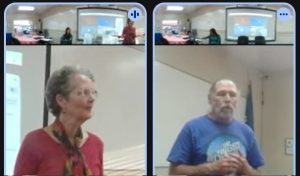Faith Center asks how its space can benefit the community
6 min read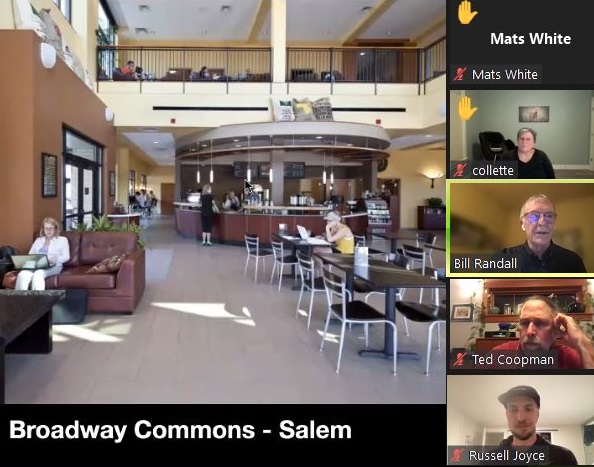
The Eugene Faith Center asks how its large property might better serve the community. At Jefferson Westside Nov. 8, Russell Joyce.
[00:00:10] Pastor Russell Joyce: Well, thank you so much everyone for having us this evening. My name is Russell, Pastor, Eugene Faith Center. I really just wanted to take a minute to introduce myself and sort of speak to the heart of what we’re hoping to do.
[00:00:22] One of the amazing things about this church is that we have such an incredible footprint. But a lot of our space, I think, goes underutilized throughout the week. And really the heart of our church and the heart of this project is how can we be a functioning part of the community and serve our neighbors and be a part of all the incredible stuff that is happening in the Jefferson Westside and Eugene area.
[00:00:46] So, that’s really the heart is how we can turn this space, this footprint that we have, into usable space throughout the week for all sorts of people in our community to use.
[00:00:57] I’m going to turn it over to Bill from Arbor South to speak a little bit more about some of the particulars.
[00:01:04] Bill Randall (Arbor South Architecture): The inspiration for this came from Broadway Commons, which is in Salem. And so if you’re in Salem, the Salem Alliance Church had a property next to them where they did a very similar concept to the community center.
[00:01:17] It is much larger, it’s a lot taller, a lot more square footage, but the idea is similar. What they do is they have various spaces in the building. They have a coffee shop on the ground floor that opens up to patios. They have meeting rooms that you can rent and just members of the community can come in and rent a meeting room if they want to.
[00:01:36] And it’s just a real, vibrant facility. My daughter and son-in-law attend that church and we’ve had a chance to go up there, but if you ever get a chance to go up there, you can kind of get an idea of what they’re doing. And it’s probably, I think, at least double the size of what we’re thinking at Faith Center.
[00:01:54] And we just wanted to get with you first and before we did our project consult with the city, and then before we actually applied for the zone change.
[00:02:04] Rene Kane (Jefferson Westside Neighbors): Gretchen Miller has a question.
[00:02:06] Bill Randall: Her question is, would they, would the businesses be open to everyone or would they be restricted to people who adhere to the church’s tenets of faith. And you know, Russell, you might be able to speak to that. I would think it would be open to everyone.
[00:02:18] Pastor Russell Joyce: Yeah. Yeah, absolutely. Businesses will be open to the community and whoever’s in the community.
[00:02:23] Gretchen Miller: That’s great. I hope that’s true. And there could be members of the community who could offend you and offend your church. And if you go in for something like yoga or a health club or, you know, I can easily see that you could get members of your congregation who don’t want people like us there. And you guys are well-meaning, but it makes me nervous.
[00:02:48] Pastor Russell Joyce: Sure. Totally. No, I mean, that’s fair. All I can say is from the people that I know, I think we hold the belief that the church’s primary service (or one of the primary services) is to love and serve people well. And so that’s certainly my heart. So it would be open to everyone.
[00:03:04] Rene Kane: Looks like we have questions. It looks like Mats is first.
[00:03:07] Mats White: Yeah. Hi there. So where are the profits going to go from the coffee shop? I mean, this is basically a way for a nonprofit entity to make money and still have that all parked on a tax-free lot. I’m pretty sure the church isn’t paying taxes at all. So this money can just go right into the church’s coffers. So why should we support a commercial designation for that property?
[00:03:27] Somebody who wanted to start a small business on that corner right there would face significant, more, just tax burden, period, on the profit, on the property, on everything. And why should we give your church a free ride, right? Why not make room for a small business to operate there outside of the boundaries of the church?
[00:03:49] You should sell part of it to a secular, commercial entity if that’s what you want to do, rather than trying to slip a money-making venture under the guise of a nonprofit church.
[00:04:00] Rene Kane: Let’s move on to Collette.
[00:04:02] Collette: Thanks for presenting this. You know, when this first came out—my wife and I live on Taylor Street, which essentially runs into the front door of the church—and when we first read about it, it was our understanding that it would be, oh, maybe a coffee shop, and now we’re talking about renting out to all these other companies and businesses and food trucks (which was really concerning, the whole food truck situation).
[00:04:23] In a matter of what?—two and a half, three blocks—we have potentially a strong chance that the Ems are coming—great. The church, great, but also sitting almost on that property is now going to be two four-story buildings, which I have no idea how many that will house, which is great.
[00:04:41] Across the street from that, we have a school. On every single Sunday, the patrons of the church take up all of our parking. When that’s not happening, all the soccer families are taking up the parking on our street. If it’s not soccer, it’s softball. If it’s not softball, it’s the parents picking up their children.
[00:04:58] And once you get your zoning change, if that should happen, then we’re essentially at your will and you’re still, you’re going to do what it is that you’re going to do, whether that’s put a food cart right out in front of my house, or whether that’s open up a bicycle repair shop inside of the church itself or somewhere inside of the existing building.
[00:05:18] I mean, I know you have large parking lots. But in the time that we’ve lived here, the Faith Center has had multiple events and multiple times the streets are taken up with all the cars. So again, I have to go back to, you know, how is that going to impact us as homeowners that literally live out the front door of the Faith Center.
[00:05:39] And again, not suggesting that the Faith Center is bad neighbors. By all means, there’s not an issue parking on Sundays. But the fear is: I don’t want to come around the corner off of Polk and see three food trucks sitting in a parking lot across the street from my house. And that’s something that came up.
[00:05:55] You’re asking an awful lot of us to be comfortable with the idea that there’s going to be even more development out our front doors.
[00:06:05] Ted Coopman: So we would expect that this would be part of the negotiation would be, what the neighbors would consider to be appropriate uses; how we could mitigate impacts on the immediate neighbors and other issues.
[00:06:19] And then that would be an agreement going forward before the neighborhood association would step in and say, you know, like, ‘Oh, you know, we think this is a really good idea.’
[00:06:28] So this is, again, this is like, we’re not even, this isn’t even the discussion. This is this discussion about the discussion that we’re going to have going forward.
[00:06:37] And I have to say that my experience with the Faith Center is that they’ve been very amenable to having substantive discussions with the neighbors.
[00:06:46] The Faith Center has always been very good about coming to us very, very early before they want to do anything. And this is part of that tradition and we do appreciate that. So this is the first conversation, not the last conversation.
[00:06:57] I have a lot of faith that we can come to something that’s going to work for everybody as far as this is concerned, because, I think it’s what we do as a neighborhood. And our neighbors include our businesses and our churches and nonprofits as well. So thank you very much. We appreciate you coming and talking to us.
[00:07:15] John Q: The Faith Center asks how its space can better serve the community.
